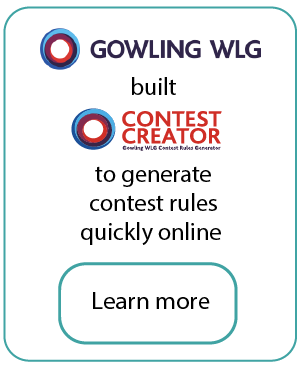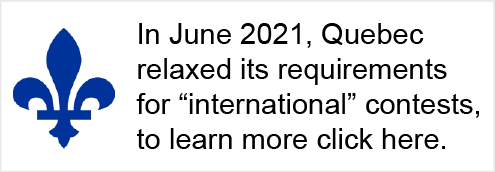What are Facebook's contest rules in Canada?
Facebook requires that you:
- Include with your promotion official rules that comply with all applicable legislation of the Canadian province(s) in which your contest takes place
- Indicate the offer terms and eligibility requirements of the promotional contest
- Include a liability release of Facebook by each entrant
- Include an acknowledgment that Facebook is not sponsoring, endorsing, or administering your contest in any way
- Clarify that any personal information or content are being collected by you and not Facebook
- Secure permission from contest participants to use their information and content
Remember to check Facebook’s Pages, Groups and Events Policies page regularly for any recent changes or additions to their rules. They change frequently.
 What are Instagram's contest rules in Canada?
What are Instagram's contest rules in Canada?
Instagram requires you to:
- Draft and maintain official rules that comply with the federal and provincial legislation of the Canadian province in which your contest takes place
- Write offer terms and eligibility requirements that adhere to applicable legislation
- Avoid encouraging users to inaccurately or inappropriately tag content
- Include a liability release of Instagram by all entrants as a condition of entry
- Include an acknowledgment that Instagram does not sponsor, endorse, or administer your contest
Remember to check Instagram’s Promotion Guidelines page regularly, as their rules can change frequently and without notice.
What are Twitter's contest rules in Canada?
On their Guidelines for Promotions on Twitter page, Twitter advises:
- You may not encourage entrants to create multiple accounts in order to enter a contest multiple times. In fact, you should explicitly disqualify people who do this.
- You may not encourage entrants to repeatedly post the same Tweet as this interferes with Twitter search. For example, do not offer rewards for the most retweets by a single user.
- You may not encourage entrants to use irrelevant hashtags or hashtags unrelated to the content they’re posting
- Your content must comply with all applicable Canadian federal and provincial legislation and regulations.
How do I run a promotional contest?
To get started on your promotional contest, you should:
- Determine your goals. Do you want to grow your follower count? Increase brand awareness? Gather leads? Convert clients?
- Set a budget. Determine how much you want to spend on prizes, administration of the contest, etc.
- Pick a platform. Do you want to run your contest on Facebook? Twitter? Instagram? An email list? A website?
- Pick a contest format. Do you want to run a sweepstake? A giveaway? A user-generated content contest?
- Run your contest.
- Gather your metrics. Determine how your contest performed. Did you meet your expectations? Were there any unexpected costs or rewards?
Remember that a promotional contest isn’t an end in itself. Presumably, you want to run a contest to accomplish some sort of goal. Keep that goal in mind at all times while you’re running your contest.
How do I run a social media contest?
A social media contest is just a subcategory of promotional contests and the same guidelines apply. There are a few extra considerations though:
- Know your platform’s rules. Go to your platform’s promotional contest rule pages to make sure you’re not violating any terms or conditions. See below for a list of links to the rules pages of major platforms:
- Facebook’s Pages, Groups, and Events Policies
- Instagram’s Promotion Guidelines
- Twitter’s Guidelines for Promotions on Twitter
- Make sure you have a reasonably large following on the social media platform of your choice. There’s not much point in running a contest on a platform if you only have seven followers.
- Publicize the winning entry. People love a celebration. Make sure you make a big deal about the winning entry. Announce it with fanfare.
How do I run a competition on Facebook?
To run a competition on Facebook, we suggest:
- Keeping your contest mobile-friendly. Most people access Facebook via a mobile device. Ensure that people can easily engage with your contest from a smartphone.
- Consider using Facebook Ads to publicize your contest. Facebook Ads can dramatically increase your reach. Consider using it to reach people who don’t follow your page.
- Stay relevant. Ensure your contest and its prizes are relevant to your audience. There’s not much sense in offering makeup fans a free copy of War And Peace by Tolstoy, for example.
How do I run a competition on Instagram?
To run a competition on Instagram, we suggest:
- Putting the focus on imagery. Remember, Instagram is about pictures. Keep your promotional material, and the focus of your contest, picture-heavy.
- Encourage legitimate engagement as part of your competition. For example, encourage entrants to post images of themselves using your brand and tagging them with the correct hashtags. Whatever you do, however, don’t encourage inappropriate or irrelevant hashtags or tagging. That’s a violation of Instagram’s rules.
- Consider engaging your audience by requesting user-generated content. Asking entrants to submit photos, pictures, and other content is a great way of getting your followers involved with your brand.
What happens if you break Facebook contest rules?
First and foremost, your contest might be deleted by Facebook. This can result in confusion, anger, and disappointment amongst your followers and, obviously, is best avoided if possible.
Repeated violations of Facebook’s promotional contest rules can result in your Page being deleted or banned.
Finally, having your contest deleted mid-giveaway can put you in violation of your own contest’s terms and conditions. A contest is a contract. If you accept entries from users and fail to follow through with a prize you may be in breach of that contract. If for no other reason but this one, it’s extremely important to ensure you comply with Facebook’s rules.
How do I write Canadian contest rules?
Your best bet is to have a qualified lawyer write your contest rules. Contest rules in Canada can get complicated and confusing, and there’s no substitute for having your very own lawyer draft a custom set of promotional contest rules.
Some major law firms in Canada, like Gowling, offer their own promotional contest rules generators. These can be cost-effective solutions for straightforward contests.
One thing we advise against is to copy and paste generic terms and conditions from a random website you’ve found. These generic terms might not apply to your contest, may lack important disclaimers, qualifiers, and releases, and may put you at risk.
Can you change contest rules?
Changing contest rules mid-stream is a dangerous proposition. While you might be able to include a term in your official rules that allows you to do so, it may run afoul of federal or provincial consumer protection legislation. It’s also, arguably, unlikely to be viewed very favorably by any court who’s asked to rule on your mid-game rule change.
You’re much better off carefully considering the contest rules beforehand and, if you encounter a problem, make note of it as an issue to be corrected before the next contest.
Why do contests in Canada have skill-testing questions?
The Criminal Code of Canada prohibits contest promoters from putting on a purely chance-based contest in exchange for money. For that reason, many contests that require a purchase as a primary method of entry add a skill-testing question to introduce a non-chance element to their contest. This allows them to avoid the prohibition in the Criminal Code.
Why do contests in Canada have math questions?
Math questions are merely the simplest form of skill-testing question that many, if not most, people can answer. It’s not language-specific and, therefore, doesn’t exclude people for whom English might be a second language.
As discussed in the previous question, “Why do contests have skill-testing questions,” Canadian legislation prohibits the use of purely chance-based contests in exchange for money. Using a skill-testing question, particularly a mathematical one, allows contest promoters to safely avoid this prohibition.
Why do contests in Canada have “no purchase necessary” conditions?
Having an Alternate Method of Entry (AMOE) that doesn’t cost anything allows a contest promoter to reasonably argue that there is no “consideration” required to enter their contest. Consideration is a legal term implying a quid pro quo. In other words, “something for something else.”
By eliminating consideration from their contest, contest promoters can avoid prohibitions contained in Canadian legislation like the Criminal Code of Canada and the Competition Act.
 Why do contests in Canada exclude Quebec?
Why do contests in Canada exclude Quebec?
Contests often exclude Quebec because Quebec has unique provincial legislation that must be complied with in order to lawfully put on a contest in that province. As a result, compliance costs rise dramatically if contest promoters include Quebec in their contests.
For example, Quebec has rules regarding the use of English and French in promotional materials, that a security deposit must be provided to the provincial government by the promoter, and that all advertising material must be filed with the regulator within the province.
Rather than comply with all of these additional rules, many contest promoters elect simply not to put on their contest in Quebec.
Do promotional contests work?
Yes! Promotional contests are a great way to accomplish a variety of business goals including:
- Increasing brand awareness
- Generating leads
- Converting clients
- Building a base of followers
However, in order to be effective, they must be properly executed and promoted. (Yes, even promotional contests must be promoted.)
Do sweepstakes work?
Yes, sweepstakes can work. Like any other promotional contest, however, they must be specifically targeted and promoted to your target audience. We suggest the following tips:
- Choose your prize(s) wisely. Tailor your prize to your target audience.
- Promote your contest heavily. No one will play if no one knows about it.
- Publicize the winners. People love feel-good stories and learning about the winner of one of your contests will make people more likely to participate in the next one.
Do sweepstakes in Canada have to be open to everyone?
No. You can reasonably limit eligibility for your sweepstakes. However, the limitations shouldn’t be contrary to good public policy or be offensive. For example, you probably couldn’t limit eligibility to a particular ethnic group unless that limitation was reasonable in the circumstances.
You can limit eligibility to people in certain jurisdictions, people of certain ages, etc. In fact, you may have to do this in order to remain compliant with Canadian legislation and regulation.
Further Resources
For information on Contest Creator, the product from Gowling WLG that generates rules for promotional contests, go to the Contest Creator product page.
For a review of Contest Creator, see our article Review of Gowling WLG's Contest Creator.
For information on the rules for promotional contests in Canada, see our short article Contests or Sweepstakes in Canada or our longer article Promotional Contest Rules in Canada.
For information on the rules for publicity contests in Quebec, see our article Publicity Contests in Quebec. For information on Quebec's language requirements, see our article Quebec's French Requirements.
For information on how to run a promotional contest on Facebook or Instagram, see our article Contests on Facebook or Instagram.
For more information on how the Competition Act and the Criminal Code govern promotional contests, go to the Competition Bureau of Canada's information bulletin here.
Legal Information
Finally, a note on how you can use the information on this page. This information is not to be considered legal advice and is not a substitute for advice from qualified legal counsel. Material aspects of this information may change at any time and without further notice.




